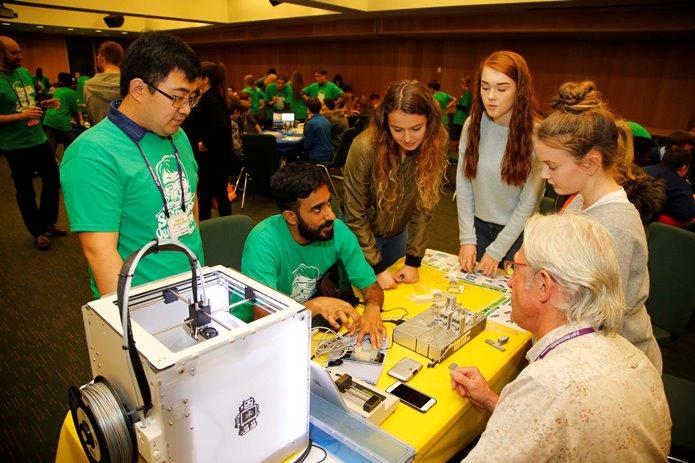

Ping-pong balls, magnets and chocolate connect students to world of STEM at MicroTAS 2016
Ping-pong balls, magnets and chocolate were in action when over 500 second level students gathered at the Convention Centre Dublin on Tuesday (October 11th) for STEM demonstrations showcased by world-class scientists as part of the 2016 MicroTAS (Micro Total Analysis Systems) conference.
This innovative outreach event was designed to encourage Transition Year students’ participation and engagement in STEM (Science, Technology, Engineering and Mathematics).
The brainchild of MicroTAS 2016 Conference Chairs, Professor Jens Ducrée (DCU) and Professor Nicole Pamme (University of Hull); it is the first outreach event that has been run in conjunction with this world class conference.
The students gained hands-on experience of cutting-edge science and met the researchers behind innovative developments in microfluidics, microfabrication, nanotechnology, integration, materials and surfaces, analysis and synthesis and detection technologies for life science and chemistry.
Dr. Eilish McLoughlin, Director of CASTeL at Dublin City University and coordinator of this outreach event commented on the value of this experience for second level students.
“The MicroTAS conference is an exciting hub for nano, bio, and medical research. The inclusion of this outreach event as part of the scientific programme offers a unique insight for Irish second level students into world-class scientific research as well as the opportunity to discuss emerging innovations with young researchers from across the globe.”
Students were introduced to various demos and experiments that integrated one or several laboratory functions on a single chip of only a few millimetres known as “lab-on-a-chip” (LOC).
They took part in hands-on activities which illustrated the design and fabrication of LOC devices such as moulding chocolate into chips, precision milling with a pantograph and exploring cell biology by creating cell-based origami as well as using ping-pong balls and magnets to simulate the capture and placement of cancer cells in a detection chamber.
The demonstrations were delivered by a field of world-class scientists who have gathered from around the globe for the five day conference, which commenced on Sunday, October 9th.
The pioneer of microfluidics Professor Elisabeth Verpoorte from the University of Groningen also presented an interactive lecture on current LOC technologies.
This year marks the 20th anniversary of the MicroTAS conference with over 1,100 academic experts, scientists and industry leaders attending the event which concludes on Thursday, October 13th.
Read an interview with Professor Elisabeth Verpoorte courtesy of Silicon Republic here
